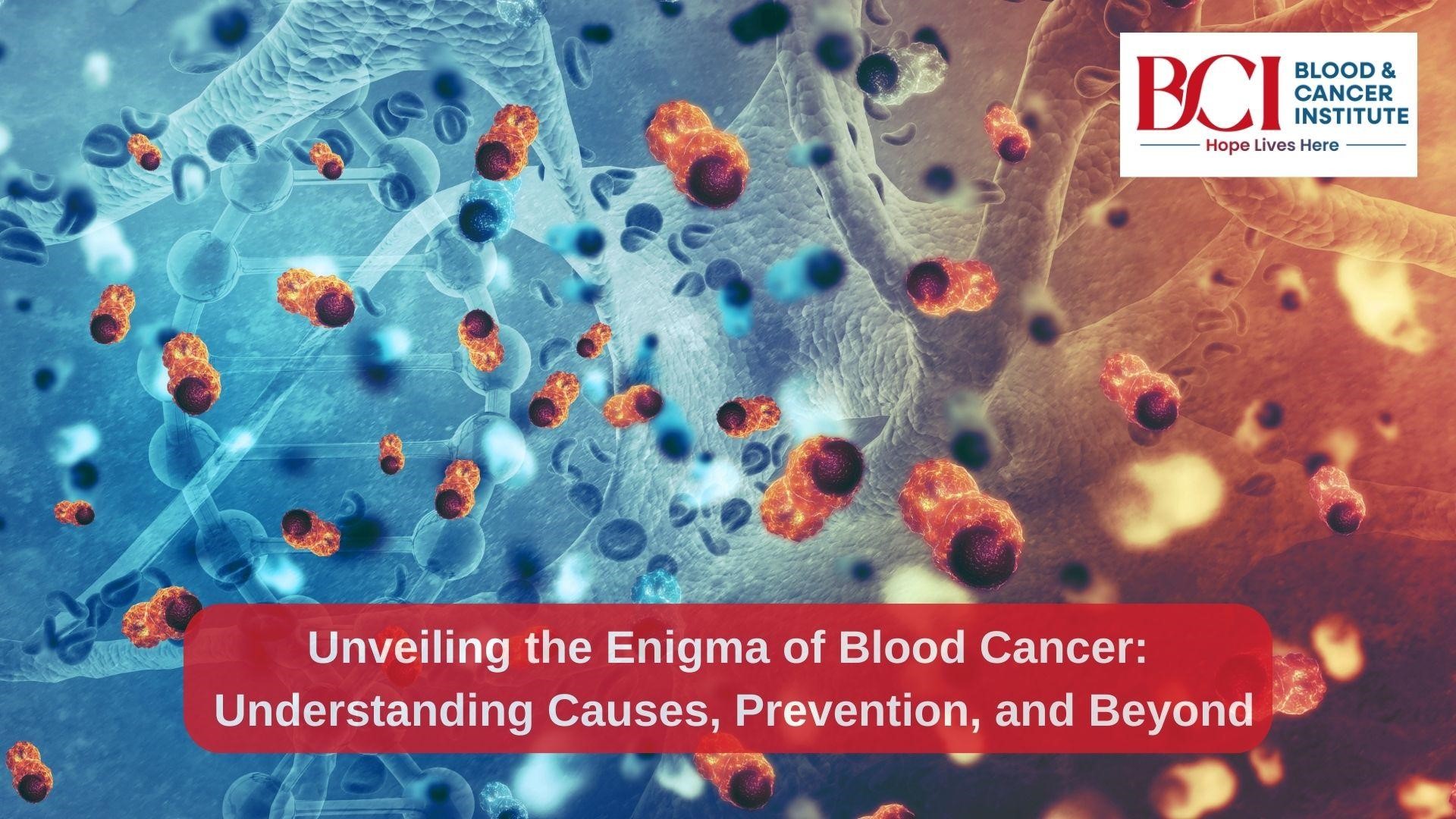
- By : [email protected]
- Blog
- Comments: 0
Unveiling the Enigma of Blood Cancer: Understanding Causes, Prevention, and Beyond From Cancer Specialist In Surat
Various types of blood cancer, such as leukaemia, lymphoma, and myeloma, remain a formidable challenge even today for oncology experts. While advancements in research and treatment have improved outcomes for many patients, the enigma surrounding blood cancer persists. In this blog post, we share the insights shared by our blood cancer specialists in Surat at BCI- Blood & Cancer Institute, including the causes, warning signs, treatment options, and possibilities for prevention and cure, shedding light on this complex disease.
What is the Main Cause of Blood Cancer?
The exact cause of blood cancer remains elusive, with a combination of genetic, environmental, and lifestyle factors believed to contribute to its development. Cancer specialists in Surat share that in some cases, genetic mutations play a significant role, disrupting the normal function of blood cells and leading to uncontrolled growth and proliferation. Exposure to certain environmental toxins, such as benzene and radiation, has also been linked to an increased risk of blood cancer. However, for many individuals, the precise cause remains unknown, highlighting the complexity of this disease.
What are the Warning Signs of Blood Cancer?
Oncologists from BCI, a cancer hospital in Surat, say early detection of blood cancer is crucial for timely intervention and improved outcomes. Recognizing the warning signs can help individuals seek medical attention promptly. Common symptoms of blood cancer may include:
- Persistent fatigue and weakness
- Unexplained weight loss
- Frequent infections or fevers
- Easy bruising or bleeding
- Enlarged lymph nodes
- Bone pain or tenderness
- Shortness of breath
If you experience any of these symptoms, it’s essential to consult a hemato-oncologist in Surat for further evaluation and diagnosis.
Can Blood Cancer be Treated?
The treatment approach for blood cancer varies depending on the type and stage of the disease, as well as individual factors such as age and overall health. Blood cancer treatment in Surat may include:
- Chemotherapy: Using drugs to kill cancer cells or inhibit their growth.
- Radiation therapy: Targeting cancer cells with high-energy radiation to destroy them or prevent their proliferation.
- Immunotherapy: Harnessing the body’s immune system to identify and eradicate cancer cells.
- Targeted therapy: Administering drugs that specifically target abnormalities within cancer cells, minimizing damage to healthy tissues.
- Stem cell transplantation: Replacing diseased bone marrow with healthy stem cells to restore normal blood cell production.
Advancements in treatment options have significantly improved survival rates and quality of life for many patients with blood cancer. However, the effectiveness of treatment can vary widely depending on individual factors and the specific characteristics of the disease.
Can Blood Cancer be Prevented or Cured?
While there is currently no sure way to prevent blood cancer, says our blood cancer specialist in Surat at BCI- Blood & Cancer Institute, adopting a healthy lifestyle and minimizing exposure to known risk factors may help reduce the risk. These preventive measures include:
- Avoiding exposure to environmental toxins, such as benzene and radiation.
- Quitting smoking and limiting alcohol consumption.
- Maintaining a healthy weight through regular exercise and a balanced diet rich in fruits, vegetables, and whole grains.
- Protecting against certain infections, such as the human T-cell lymphotropic virus (HTLV-1) and the Epstein-Barr virus (EBV), which have been associated with an increased risk of certain types of blood cancer.
As for a cure, while some cases of blood cancer may be cured with appropriate treatment, others may require ongoing management to control the disease and minimize its impact on daily life. Research into novel therapies and targeted treatments continues to advance, leukaemia treatment in Surat offers hope for improved outcomes and ultimately, a cure for blood cancer.
The Importance of Research and Support
Research plays a pivotal role in finding the answers to the mysteries of blood cancer. Therefore, continuous efforts in scientific inquiry and clinical trials is essential for developing more effective treatments, enhancing early detection methods, and ultimately, finding a cure.
Other than this, support networks and resources for individuals affected by blood cancer are invaluable. Many organizations are working towards offering information, advocacy, and support services for patients, caregivers, and healthcare professionals alike.
Final Words
While blood cancer presents formidable challenges, understanding its causes, recognizing warning signs, and exploring treatment options offer hope for patients and families affected by this complex disease. By promoting awareness, supporting research efforts, and advocating for improved access to care, we can work together to unravel the enigma of blood cancer and ultimately, improve outcomes for all those impacted by it.
